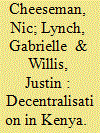|
|
|
Sort Order |
|
|
|
Items / Page
|
|
|
|
|
|
|
| Srl | Item |
| 1 |
ID:
145955


|
|
|
|
|
| Summary/Abstract |
Kenya's March 2013 elections ushered in a popular system of devolved government that represented the country's biggest political transformation since independence. Yet within months there were public calls for a referendum to significantly revise the new arrangements. This article analyses the campaign that was led by the newly elected governors in order to understand the ongoing disputes over the introduction of decentralisation in Kenya, and what they tell us about the potential for devolution to check the power of central government and to diffuse political and ethnic tensions. Drawing on Putnam's theory of two-level games, we suggest that Kenya's new governors have proved willing and capable of acting in concert to protect their own positions because the pressure that governors are placed under at the local level to defend county interests has made it politically dangerous for them to be co-opted by the centre. As a result, the Kenyan experience cannot be read as a case of ‘recentralisation’ by the national government, or as one of the capture of sub-national units by ‘local elites’ or ‘notables’. Rather, decentralisation in Kenya has generated a political system with a more robust set of checks and balances, but at the expense of fostering a new set of local controversies that have the potential to exacerbate corruption and fuel local ethnic tensions in some parts of the country.
|
|
|
|
|
|
|
|
|
|
|
|
|
|
|
|
| 2 |
ID:
118963


|
|
|
|
|
| Publication |
2013.
|
| Summary/Abstract |
Following the elections of 2007, there was a significant increase in public expressions of secessionist feeling on the Kenya coast. During 2010 and 2011, one manifestation of this was the emergence of the Mombasa Republic Council (MRC), which demands independence for the coastal region. The language of secessionism is historical, and revisits the vivid political debates of the late 1950s and early 1960s, when politics in coastal Kenya revolved successively around two constitutional issues. The first was the possibility that the Ten-Mile Strip, nominally the sovereign territory of the Sultan of Zanzibar, might not become a part of independent Kenya; the second was the 'regionalist' constitution of 1963-4. This article explores the way that people now retell the history of earlier debates, and argues that these retellings suggest both the power and the plasticity of claims to historical knowledge, and that they reveal a profound fault line within 'secessionist' opinion, which separates those who claim political primacy on the basis of autochthony from those who locate their claim to independence in the language of colonial-era treaties. Such divisions are important, because they shape the way that secessionist arguments are framed, and the potential for secessionist politics to undermine the unity of the Kenyan state.
|
|
|
|
|
|
|
|
|
|
|
|
|
|
|
|
| 3 |
ID:
106995


|
|
Sudan handbook
/ Ryle, John (ed); Willis, Justin (ed); Baldo, Suliman (ed); Jok, Jok Madut (ed)
|
2011

|
|
|
|
| Publication |
Sudan, James Currey, 2011.
|
| Description |
xx, 220p.
|
| Standard Number |
9781847010308
|
|
|
|
|
|
|
|
|
|
|
|
Copies: C:1/I:0,R:0,Q:0
Circulation
| Accession# | Call# | Current Location | Status | Policy | Location |
| 056167 | 962.4/RYL 056167 | Main | On Shelf | General | |
|
|
|
|
| 4 |
ID:
094922


|
|
|
|
|
| Publication |
2010.
|
| Summary/Abstract |
This article explores the history of elections by secret ballot in Sudan since the 1950s, and considers what lessons this history may offer in the run-up to the national elections planned under the Comprehensive Peace Agreement. The article locates the repeated use of the secret ballot in Sudan in the context of a wider state-directed project of modernity, for which the secret ballot offers a performative enactment of the relationship between an efficient state and a disciplined citizenry. The article therefore focuses on the actual procedure of elections, rather than on high politics, and it argues that despite a formal insistence on consistent procedure, practice often deviated from the supposed rules. While in some cases such deviations were driven by political manipulation, they were at other times simply the result of a lack of resources; such deviations were covered up by officials who were well aware of the immense value placed on the performance of the secret ballot. It seems likely that the coming elections will see similar problems and deviations from the rules, and that the elections are unlikely to achieve the intended aim of developing a more inclusive political culture.
|
|
|
|
|
|
|
|
|
|
|
|
|
|
|
|
|
|
|
|
|